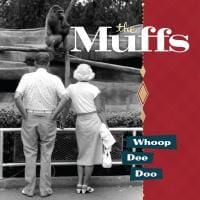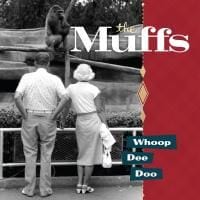
At the moment Kim Shattuck is probably best known in the indie rock world as the woman who replaced Kim Deal as the bassist in the reunited Pixies and lasted about six months before getting fired from the band herself. But Shattuck has a long history as the lead singer and songwriter for the Muffs. The Muffs came up in the ‘90s, where Shattuck’s sugary pop hooks and punky attitude nestled right in with the pop-punk explosion. That explosion never really translated into major success for the band, whose only mainstream claim to fame was their cover of “Kids in America” for the soundtrack to the movie Clueless (also later resurrected in the Rock Band 2 video game). Regardless, the band had a fine run of albums in the ‘90s, cresting with ‘97’s excellent Happy Birthday to Me before they petered out after ‘04’s Really Really Happy.
So, fresh off that short stint with the Pixies, Shattuck has reformed the Muffs with the classic lineup intact for their first album in a decade. Shattuck handles vocals and guitar with Ronnie Barnett on bass and Roy McDonald on drums. And Whoop Dee Doo sounds pretty much like every other Muffs album. Shattuck’s ear for pop hooks is as reliable as ever, while her nasally whine of a voice remains very much an acquired taste. Longtime Muffs fans will likely still find her singing goofily charming, and anyone who managed to enjoy ‘90s punk singers such as Tom DeLonge from Blink-182, Fat Mike from NOFX, and (most egregiously) Joey Cape from Lagwagon, will probably be able to get behind her singing voice without much trouble. Others may have more difficulty.
The album opens with a pair of songs that pretty much sum up the Muffs focus on annoyed aggression and unrequited love. “Weird Boy Next Door” is all about how much of violent moron the neighbor kid is, summed up by the lines “Yeah, he’s like a caveman / But he’s not as clever / In fact he’s dumber / Than a common rat,” and punctuated by Shattuck’s howls. “Paint By Numbers” is a slightly slower song, with a prettier melody, which is appropriate for the lyrics about how Shattuck is so in love with a boy she sees every day but never actually speaks to. And while there are some cute “Woo-hoo-hoo”s here, Shattuck lets loose with just as many between-lyrics howls as in the previous song.
That’s pretty much how it goes for the 12 songs on the album, with some minor musical variations and a couple of real songwriting gems where the hooks are particularly sharp. “Take a Take a Me” has a noticeably swinging, danceable feel, courtesy of Barnett and McDonald’s spacious rhythms that stay locked into a ‘60s pop feel without ever going into driving, punkier beats. The addition of a subtle Farfisa organ in the background nicely adds to that ‘60s feel. “Cheezy” sounds like a traditional Muffs song in almost every way, except for the harmonica that gives the whole track a slightly different tone. “I Get It” qualifies as a major departure for the band because it’s a genuine duet with Barnett sharing vocal duties.
First single “Up and Down Around” is a mid-tempo song in 6/8 time with a strong chorus and some well-placed backing vocals with completely appropriate “Ahh”s and “Do do do do”s. It’s the longest song on the album at a whopping four minutes flat, which leaves time for a very effective quiet bridge, as well as a handful of great drum fills from McDonald and a nice extended guitar solo from Shattuck. The equally excellent “Like You Don’t See Me” is like a full-on classic Muffs track, with a chorus that strains Shattuck’s vocal range in the best way and a subdued post-chorus that immediately gives the song a completely different feel.
It’s nice to hear Shattuck leaving her Pixies experience behind and getting back to her specialty. The Muffs sound like they’re having a lot of fun here, and the album is full of energy. It’s hard to imagine that Whoop Dee Doo will draw a fresh audience to the band, but fans of The Muffs should be pleasantly surprised at how solid this album is.

